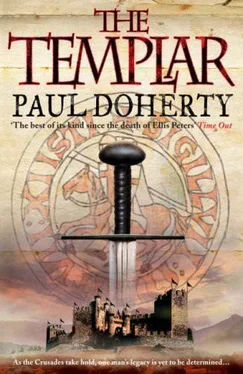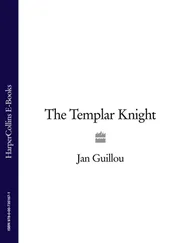P. Doherty - The Templar
Здесь есть возможность читать онлайн «P. Doherty - The Templar» весь текст электронной книги совершенно бесплатно (целиком полную версию без сокращений). В некоторых случаях можно слушать аудио, скачать через торрент в формате fb2 и присутствует краткое содержание. Год выпуска: 2010, ISBN: 2010, Издательство: Minotaur Books, Жанр: Исторические приключения, на английском языке. Описание произведения, (предисловие) а так же отзывы посетителей доступны на портале библиотеки ЛибКат.
- Название:The Templar
- Автор:
- Издательство:Minotaur Books
- Жанр:
- Год:2010
- ISBN:9780312576837
- Рейтинг книги:5 / 5. Голосов: 1
-
Избранное:Добавить в избранное
- Отзывы:
-
Ваша оценка:
- 100
- 1
- 2
- 3
- 4
- 5
The Templar: краткое содержание, описание и аннотация
Предлагаем к чтению аннотацию, описание, краткое содержание или предисловие (зависит от того, что написал сам автор книги «The Templar»). Если вы не нашли необходимую информацию о книге — напишите в комментариях, мы постараемся отыскать её.
The Templar — читать онлайн бесплатно полную книгу (весь текст) целиком
Ниже представлен текст книги, разбитый по страницам. Система сохранения места последней прочитанной страницы, позволяет с удобством читать онлайн бесплатно книгу «The Templar», без необходимости каждый раз заново искать на чём Вы остановились. Поставьте закладку, и сможете в любой момент перейти на страницу, на которой закончили чтение.
Интервал:
Закладка:
‘Foresworn he is,’ he whispered. ‘Foresworn he shall remain.’
At the end of January, Firuz called his household and guests together. Tonight they would celebrate, he declared, for wonderful news had arrived: Ridwan, Emir of Aleppo, was marching with twelve thousand men to raise the siege. The news had spread like wildfire through the city, and there were jubilations, dancing in the street, celebrations at the palace.
‘We will crush them!’ Firuz declared. ‘We shall crush the infidels between Ridwan’s army and the walls of Antioch.’
Theodore tried to put a brave face on it. Imogene had to leave the room, claiming she felt unwell. It seemed as if the Army of God was destined for destruction. Later that evening they gathered in their chamber. Theodore could offer no comfort.
‘We can do nothing,’ he whispered hoarsely, ‘except pray.’
They waited. The days passed. At last news began to seep through. A miracle had occurred! Apparently the Army of God had decided to meet the foe out in the open. They put the command of the camp under Adhémar and Count Raymond, whilst Bohemond led out a thousand mounted men to meet an army of twelve thousand. He took up position near the Iron Bridge and camped on level ground about a mile long between a great lake and the marsh, which would defend his flanks. He then organised his division into six cohorts and simply waited for Ridwan to approach. He did so swiftly, just after dawn. Scouts rode into the Frankish camp screaming how the enemy were almost upon them. Bohemond raged around, kicking men awake, urging them to don harness and saddle their horses. He ordered his cavalry out, five phalanxes lined up side by side; the sixth he kept in reserve.
Ridwan’s army came on, thousands of them in two formations. The Turks expected the Franks to attack, but they did not, and the Turks had no choice but to come on, approaching at a trot. It was a grey day, so Eleanor later learned for her chronicle, and the battle was fought in a bleak place, a desperate struggle for survival. Turkish arrows whirred through the air, but still the Frankish line did not move. Saddles emptied, horses reared, plunged and panicked. The Franks just sang, verse after verse of the same psalm, as destruction fell on them. At last the Turks broke into a full charge and so did the Franks, long lances going down, shields up as they spurred their charges on. They ploughed into the Turks, sending the first line reeling back on to the second to cause utter confusion. Bohemond then committed his sixth phalanx, which circled the battlefield and tore into the right flank of the enemy. The swift horses of the Turks did not avail them. Bohemond surged on like a reaper through corn, first with his lance then his sword, his knights following, their crimson standards rippling in the breeze. The Frankish charge was relentless. Swords flashed, cutting through the enemy like a knife would cloth, dealing out death to the left and to the right. The Turks broke, fleeing back. The Franks pursued. Confusion amongst Ridwan’s forces spread like ripples of water merging into each other. In the end, Ridwan of Aleppo and his captains fled, leaving the field to Bohemond and his knights, who stormed the enemy camp and took possession of it. The black banners of anarchy were unfurled. No prisoners were taken. Wholesale executions were carried out. A day later, Bohemond arranged stakes along the ditch before Antioch. On each he placed a head so that the city garrison could stare out at the thousands of poles each bearing its gruesome trophy.
The news of Bohemond’s victory spread gloom throughout Antioch, astonishing Yaghi Siyan and his council. Nevertheless, they still hoped that famine and pestilence would devastate the besiegers. The reports coming into the city were increasingly grim. The Franks were grubbing for roots and chewing on leather to stifle the ache of hunger. They gorged themselves on the sticky-sweet meat of dead camels and trapped rats and mice. Some of them turned to cannibalism and collected the carcasses of dead Turks, which they skinned and skewered, boiling chunks of flesh in their great cauldrons. Word of the ghastly feast spread through the camp and people came to watch. Once they had tasted human flesh, the perpetrators searched for more amongst the Muslim tombs outside the city.
Theodore confided to Eleanor how the Army of God had now shrunk to thirty thousand, yet they were still intent on victory, especially as help had arrived. Ships from England and Hainault docked in the port of St Simeon, bringing in engineers and wood to build siege engines. Yaghi Siyan heard about this and launched fierce raids, but they were driven back. The Franks had now decided that all gates to the city should be blockaded. They seized an abandoned mosque near Bridge Gate, beat off attackers, dug a double ditch and built a limestone wall with a tower which they nicknamed ‘La Mahomeri’, the old French for the Blessed Virgin Mary. Worse was to come. Tancred had taken up residence in the hills near the St George Gate. He attacked caravans and supply wagons, seizing horses and provisions before moving to occupy and fortify a disused monastery nearby.
As March turned into April, the city of Antioch realised that the Franks were still resolute in their aggression. Each gate was now controlled and blockaded, and despite sallies and forays, the Army of God held fast. In Antioch, fear and panic began to spread. No longer were the markets and bazaars full. The city teemed with people, and as the Franks tightened their belt around it, hunger soon made itself felt. Eleanor and the rest were no longer invited to banquets and feasts. Food grew scarce. Prices began to rise. The siege started to bite savagely. Yaghi Siyan turned to terror. He had prisoners taken up on to the walls. One knight, Reynold, captured in a foray, was ordered to renounce his faith but refused and was promptly executed on the battlements, his corpse tossed over into the ditch. Other prisoners were paraded. Again they were asked to renounce their faith but refused. Yaghi Siyan ordered brushwood to be gathered; the prisoners, men and women, were tied to stakes and the fires lit. The screams of the burning captives could be heard all over the Frankish camp, but such barbarity only strengthened their resolve.
Inside Antioch, Theodore continued his deception. Eleanor reasoned that he must have communicated somehow with Bohemond, for the Poor Brethren of the Temple appeared in the rocky passes and culverts beneath the tower of the Twin Sisters. Theodore became busy advising Firuz on the mangonels, catapults and mantlets the Franks brought up. Eleanor felt she was in a waking dream. She was locked in the tower, acting as if this was her life, whilst a mere arrow-cast away, her beloved brother Hugh, Godefroi and the rest took up positions to shatter the world she sheltered in.
Life in the Twin Sisters was certainly changing. The blockade of Bridge Gate and the St George Gate, and the presence of the Franks in the foothills of Mount Silpius, had their effect. Food, supplies and provender were abruptly cut off. Markets closed. Bazaars emptied. Stallholders had nothing to offer as famine crept the streets. The effect of such strictures deepened. The Armenian population became restless; even Firuz began to rail at the harsh regime of Yaghi Siyan, arguing that his ruler should at least seek terms of surrender from the Army of God. Theodore, skilful and sly, noted this and cast about looking for an opportunity. Asmaja provided it.
Eleanor had volunteered to look after washing the clothes. These were piled into great tubs, soaked, squeezed and taken down to a nearby olive grove to be stretched out for the day. One morning early in May, taking advantage of the strengthening sun, she was laying out some garments when a flash of colour caught her eye. She left the baskets, moving silently as she had done when she and Hugh were children playing in the woods near their parents’ manor at Compiègne. It was a beautiful day, the grass alive with crickets, birds singing in the branches above her, the scent of wild primrose heavy on the morning breeze. On the far side of the grove, she glimpsed Asmaja and Baldur, two lovers entwined, kissing and embracing, passionate in their desire for each other. Eleanor felt guilty, yet she stayed and observed even as Baldur took Asmaja deeper into the trees. She watched as they lay down, unaware of the sounds around her; only the flash of cloth kept her attention before she stole away. She felt guilty, disturbed at what she’d seen, but eventually she informed Theodore. During their stay in the tower, he’d kept his distance, acting the distracted husband, never intimate or personal. Now he took her hands in his and kissed her fingers gently.
Читать дальшеИнтервал:
Закладка:
Похожие книги на «The Templar»
Представляем Вашему вниманию похожие книги на «The Templar» списком для выбора. Мы отобрали схожую по названию и смыслу литературу в надежде предоставить читателям больше вариантов отыскать новые, интересные, ещё непрочитанные произведения.
Обсуждение, отзывы о книге «The Templar» и просто собственные мнения читателей. Оставьте ваши комментарии, напишите, что Вы думаете о произведении, его смысле или главных героях. Укажите что конкретно понравилось, а что нет, и почему Вы так считаете.












